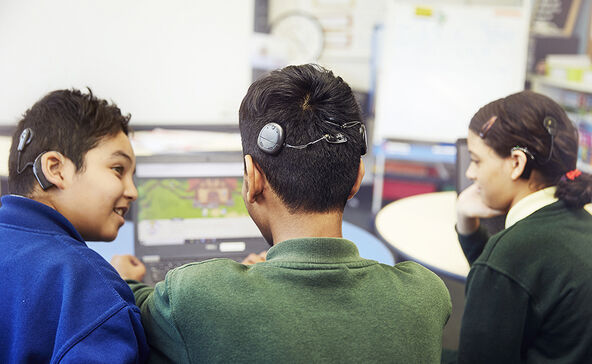Key Details
- Categories
- Masterclass Series
- Course Code
- CPE25MC-DHH
Course Information
Remediating Speech Using a Listening and Spoken Language Framework
Children with hearing loss can now be identified at birth, fitted with auditory technology by 3 months of age, engage with their families in intervention programs by 6 months, and can develop speech on par with their hearing-age peers. Some children, however, for a variety of reasons, miss these developmental milestones. Perhaps they were identified late, or have additional challenges, presenting with complex needs. Their speech development may require a more structured approach, but one that can still focus on connecting development with audition.
The course series covers speech remediation principles and strategies for children with hearing loss, when acquiring speech through a typical, developmental process may be at risk. Each course in the series covers one speech aspect, focusing on remediating that aspect using a listening and spoken language framework. Each course presents the features of the speech aspect, speech acoustics, typical development and common error patterns, facilitating contexts, remediation strategies, and research. Courses included video case studies and tools for assessment and remediation of each speech aspect.
Session 1: Remediating Speech Using a LSL Framework: Auditory Foundations
This course presents the foundations of remediating speech through a listening and spoken language framework, including assessing auditory access for speech perception, speech assessment, developmental vs. remedial models, and current research on speech remediation.
Session 2: Remediating Speech Using a LSL Framework: Voice and Prosody
This course presents the features of voice and prosody, their speech acoustics, typical development and common error patterns, facilitating contexts, remediation strategies, and relevant research.
Session 3: Remediating Speech Using a LSL Framework: Vowels and Diphthongs
This course presents the features of the speech aspect, their speech acoustics, typical development and common error patterns, facilitating contexts, remediation strategies, and relevant research.
Session 4: Remediating Speech Using a LSL Framework: Nasals
This course presents the features of nasal consonants, their speech acoustics, typical development and common error patterns, facilitating contexts, remediation strategies, and relevant research.
Session 5: Remediating Speech Using a LSL Framework: Plosives and Stops
This course presents the features of plosives and stops, including the alveolar tap, their speech acoustics, typical development and common error patterns, facilitating contexts, remediation strategies, and research.
Session 6: Remediating Speech Using a LSL Framework: Fricatives
This course presents the features of fricatives, their speech acoustics, typical development and common error patterns, facilitating contexts, remediation strategies, and relevant research.
Session 7: Remediating Speech Using a LSL Framework: Affricates
This course presents the features of affricates, their speech acoustics, typical development and common error patterns, facilitating contexts, remediation strategies, and relevant research.
Session 8: Remediating Speech Using a LSL Framework: Liquids
This course presents the features of liquids, including the American retroflex /ɹ/, and the alveolar liquid /l/, their speech acoustics, typical development and common error patterns, facilitating contexts, remediation strategies, and relevant research.
This series has been approved for 8 CEUs with code CE-NSI-22-001.


